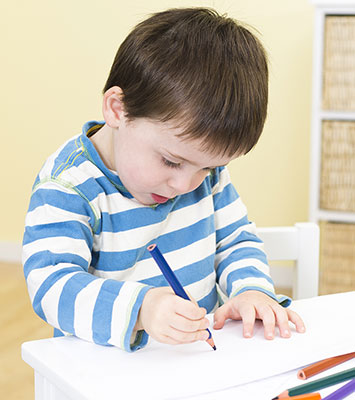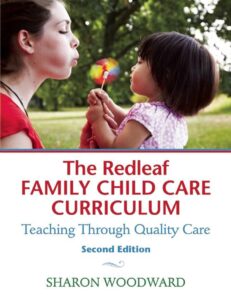Child Development
This topical guide will introduce you to important books, videos, and information resources available from the EI Clearinghouse and other sources. Contact us via online form or by phone (1-877-275-3227) to request a resource listed below (or ask your local public librarian). Note that some videos may be viewed online, and journal titles will take you to the publisher’s homepage.
Table of Contents

EIC Resources
A parent-friendly tip sheet created by the Illinois Early Intervention Clearinghouse.
Books
This book helps parents with evidence-based advice for dealing with the most common issues facing babies and toddlers, including breastfeeding, baby care, developmental stages, first aid and injuries, sleep, vaccines and more.
Drawing from evidence-based practice and the latest research, this book explains the multitude of benefits of big body play for young children’s social-emotional, cognitive, and physical development. Also learn how to organize the physical environment, set rules and policies, and supervise the play.
The book presents a detailed and in-depth picture of early years development, particularly of developmental processes and interactions. It also emphasizes appropriate pedagogical approaches and the implications for adults who work with young children.
This book explores how increasing knowledge of neuroscience and advances in methods of investigation are changing our understanding of child development and offers insight into the connections between brain development and how children think and feel.
This book provides readers with an in depth overview of typical child development from a psychological lens. This resource explains the major psychological theories that have influenced child development in the past and in recent years.
This handbook serves as a guide to the benchmarks of typical development for each age and stage that almost all children go through.
This text book simplifies the theoretical and psychological perspectives about child development with a special emphasis on the diversity of different cultures which influence growth. This resource focuses on each of the different areas of typical development
This book addresses the remarkable attributes of brain development but, more importantly, guides the reader to create environments and experiences for young children that will effectively enhance their developing brains, and supporting children to flourish as human beings.
With over 30 years of experience in guiding parents in their child’s development, pediatric occupational therapist Sharon Drewlo brings you GUIDE & GROW: Baby’s 1st Year, an easy-to-navigate monthly guide to understanding and supporting your baby’s development throughout the first year.
This book invites those caring for infants to join as companions on an incredible journey. Each chapter taps a distinct area of research to shed light on babies’ biological expectations for care and their amazing competence as active participants in that care.
The first few years of life are the most important for a child’s future development. This book will help readers understand the development process, know what to expect, how to react and when to seek help to ensure a healthy child.
This engaging and versatile text gives professionals the guidance they need to work with families and to help build a foundation for children’s healthy social and emotional lives.

The Redleaf Family Child Care Curriculum: Teaching Through Quality Care. This leading resource is a specifically designed curriculum for family child-care providers. They will be able to incorporate best practices and activities appropriate for the mixed ages of children in their care
This book outlines the main theoretical perspectives including psychodynamic psychology, behaviorism, logical constructivism, social constructivism, evolutionary psychology, ethological psychology, ecological psychology, information processing, and critical developmental psychology.
This book explains key topics including: theories of cognitive development; attention, memory, and executive function; conceptual development and reasoning, theory of mind; intelligence; and learning and instruction.
This book explains key topics including: Emotions and emotion regulation; temperament and personality; moral development; prosocial and antisocial development.
This book is an exploration of story and its importance in early childhood. It provides a thorough theoretical foundation and considers how to practically implement the use of stories to aid children’s wellbeing and holistic development.
Videos and Media
This video is grouped in pre-locomotion and locomotion sections to enhance the viewer’s observation skills and understanding of the natural progression of the baby’s movement development, preverbal communication, and play interactions
This video helps the viewer discover how babies move to learn, communicate and interact in their environment.
Skills such as taking a first step, smiling for the first time, and waving “bye bye” are called developmental milestones. Children reach milestones in how they play, learn, speak, act, and move (crawling, walking, etc.). The CDC Act Early campaign has created a series of short video clips of children demonstrating specific developmental milestones. The videos are grouped by the approximate age a milestone is typically reached.
A video guide to child development and appropriate ways for parents to help their children learn and develop. The developmental periods are divided into 0-3 months, 3-6 months, 6-12 months, and 12-24 months. Some of the topics include: physical growth, breastfeeding, bottle feeding, sensory development, touching and bonding.
Many young children have difficulties transitioning from one activity to the next, whether it’s from playing to eating, or trying to get to the car to go somewhere. This video discusses temperament, child development and offers tips and tricks for making transitions go smoothly.
These key scientific concepts are the building blocks of the core story of child development. Each page within this section provides a concise video overview of a different key concept and aggregates a variety of resources. See video description for additional videos in this series.
By watching a dozen families in unique situations, Dr. T. Berry Brazelton shows how and why children develop the way they do. Touchpoints are defined as periods of time that precede rapid growth in learning for parent and child. This DVD provides comprehensive information on development of infants and toddlers, including how to manage temper tantrums and excessive crying appropriately.
Organizations
The Early Childhood Learning & Knowledge Center houses important information for Head Start programs, providers, and families, along with high-quality general early childhood information.
This is a professional membership organization that works to promote high-quality early learning for all young children, birth through age 8, by connecting early childhood practice, policy, and research.
VEIPD provides coordination and oversight of Virginia’s Comprehensive System of Personnel Development (CSPD) for early interventionists who provide supports and services for infants and toddlers with developmental delays and disabilities and their families under Part C of the Individuals with Disabilities Act (IDEA). See Early Intervention Topics & Trends and Talks on Tuesdays Webinars.
This site provides resources for families and caregivers of children birth to age three.
Articles
This article addresses parenting, culture, and the intersection of the two. The study of parenting in culture is one of similarities and differences in parental cognitions and practices and their meaning. The author provides illustrations for each.
Starting from birth, infants begin learning how to make sense of their world through interactions with caregivers. This article describes how reflective care supports healthy social-emotional development in infants and toddlers.
This article offers a brief explanation of motor development as a constant learning process.
This article provides an overview of self-regulation and the key terms related to self-regulation, such as executive function.
Web Resources
This web resource offers fun, engaging activities to promote child development.
This site provides resources for parents of children of all ages.
This policy statement reviews the existing literature on television, videos, and mobile/interactive technologies; their potential for educational benefit; and related health concerns for young children (0 to 5 years of age).
Skills such as taking a first step, smiling for the first time, and waving “bye bye” are called developmental milestones. Children reach milestones in how they play, learn, speak, act, and move. Milestones checklists available in English, Spanish, Arabic, Brazilian Portuguese, Farsi, French, Haitian Creole, Hindi, Korean, Simplified Chinese, Somali, and Vietnamese.
Track your child’s milestones from age 2 months to 5 years with CDC’s easy-to-use illustrated checklists; get tips from CDC for encouraging your child’s development; and find out what to do if you are ever concerned about how your child is developing.
Provides early childhood professionals and policy makers a framework for understanding child development by presenting information on what children know and should do and what development looks like in everyday life.
These four training modules were developed to help caregivers understand and support social-emotional development in infants and toddlers.
Children vary in their development of speech and language skills. However, they follow a natural progression or timetable for mastering the skills of language. A checklist of milestones is shown for the normal development of speech and language skills in children from birth to 5 years of age.
This PBS program provides parents and early care providers information on the physical and social-emotional development of children from birth to age 5.
This set of age-based handouts include a “what to expect” chart for each age range, frequently asked questions, a research summary, and information about common parenting challenges for each age and stage.

